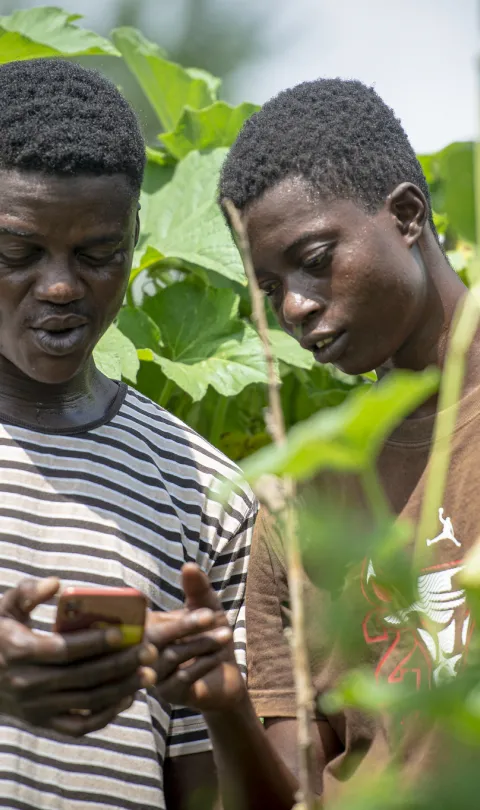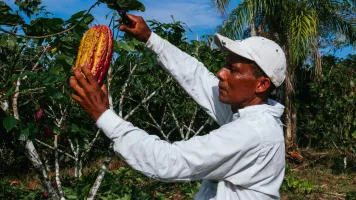There’s an information gap that keeps us from eradicating food insecurity as hundreds of millions of people around the world continue to go hungry every day. Low and middle-income countries spend around $190 billion annually on agriculture to address food insecurity. Yet the data to effectively target this spending or measure results is often patchy, outdated or simply doesn’t exist. That’s why we are urgently calling for renewed investment and collaboration in a new report ahead of the Committee on World Food Security’s public event on data this week.
A look at reporting on food systems puts this gloomy picture into sharp relief. Fewer than 10% of countries globally have the capacity to collect or publish sufficiently-disaggregated data on agri-food systems. As an example, data on small-holder farmers—a key indicator for Sustainable Development Goal (SDG) 2 on ending hunger—is available for income in 38 countries and productivity in only 11 countries.
Sketchy data exists amidst the worsening global picture of food insecurity. Estimates suggest that around 690 million people face food insecurity today, an increase of 60 million (10 million each year) since 2015. Covid-19 may have pushed up to 32 million more people into chronic hunger.
The case for better data to address hunger
Data must underpin global efforts to fight food insecurity. Why? With accurate, accessible and timely disaggregated data, domestic planners and policy-makers can effectively allocate resources and respond to ongoing crises. Farmers with data on environmental changes can know better when to plant and harvest. Donors can target funds to have a greater impact.
Yet domestic policy-makers in low and lower-middle income countries who want more and better data on food systems face a range of barriers: lack of coordination among donors, limited statistical capacity and—most importantly—the lack of effective investment.
As we outline in the report, more effective investment and collaboration are the keys to building up country-level data collection and systems. The report is based on a series of informal dialogues and key informant interviews with experts from over forty organizations, including Rome-based member states, donor agencies, international organizations, the private sector, civil society, and country partners in Africa and Latin America.
Here are four key considerations in making (and driving) the case for change for those engaging in this year’s Committee on World Food Security’s data work stream:
- Countries face chronic lack of investment in data collection and statistical systems. Across all countries we engaged with, the biggest challenges relate to limited resources dedicated to collecting and publishing agri-food systems data. Funding from donors often complicates this situation. Short-term projects and donor priorities lend neither sustainability nor effective capacity development to domestic efforts to produce agricultural and food systems data.
- Existing investments have limited effectiveness. The lack of coordination among internal partners, donors and other stakeholders has led to a proliferation of initiatives and activities. These good intentions make bad situations worse by duplicating local efforts, undermining national strategies and producing unsustainable and ultimately ineffective programs.
- Inclusive data governance and sharing approaches are essential. Stakeholders report that trust is essential for effective data use, collaboration and sharing. Users’ needs—from the data collection to production stages—must drive processes that align domestic demand for and supply of data. Data is useless when it does not speak to local priorities or meet the needs of domestic policy makers.
- Digital and alternative data sources can enable more effective collaboration, but traditional data sources are still needed. New technology has brought diverse stakeholders to the table, offering opportunities to address food insecurity through innovation and development. Cheaper, faster and more efficient data collection methods provide a potential pathway to transform data systems, but our research shows that failure to invest in traditional data sources may render such innovations unusable by countries.
Collaboration at all levels is critical
There is growing evidence that collaboration among partners inside and outside of government to gather and share data results in programs that are more effective in responding to agriculture and food insecurity needs.
Take Ghana as an example, where agricultural sector jobs account for more than half of employment nationally. Here a collaborative platform among public and private actors has created access to mobile phone technology and provided climate-smart agricultural services to small-holder farmers. In a survey, 97 percent of farmer respondents said the information on weather patterns and crop market prices was “very useful.” This is just one example of how multi-stakeholder collaboration has strengthened data capacity and put more and better data in the hands of government decision-makers and farmers on the front lines of the battle against hunger.
Better collaboration and coordination requires action at all levels:
- Governments need to step up domestic investment and improve collaboration across all levels of decision making to increase the effectiveness of investments in agriculture and food data systems.
- Donors must scale up investments in data and statistics—focusing on capacity-building within countries—and increase coordination with other stakeholders, including other donors, to avoid duplicating efforts.
- Non-governmental actors must improve collaboration, support national priorities and explore opportunities to supplement existing country-led efforts.
The international community has a unique opportunity to take urgent and immediate action to reverse the trend of increasing food insecurity. Making sure accurate and timely data is in the hands of decision makers is an essential first step. Get in touch by emailing us at [email protected] if you’d like to find out more about our research or join our network in making the case for change.
Read the full report here: "Data for Food Security: What can the international community do to create transformative change?"
Abstract: Innovations in digital technology and the use of alternative data sources have decreased the cost and increased the speed of data collection and use. Harnessing this potential requires increased investment by donors and governments and a more effective approach that strengthens foundational data systems and governance frameworks, and supports local knowledge and capacity development.
***
Janet McLaren contributed writing and editing to this post based on the original report. She is the research and editorial consultant for the Agricultural Data to Tackle Food Insecurity project at the Global Partnership for Sustainable Development Data.

